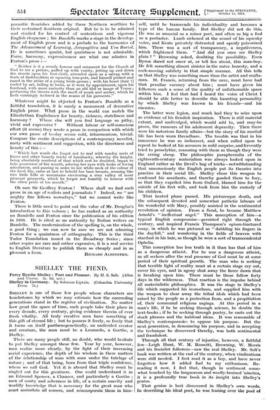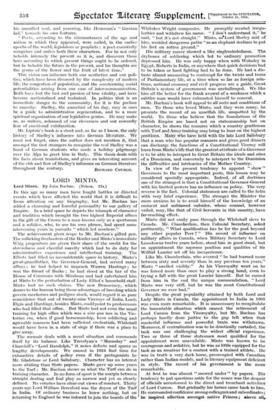SHELLEY THE FIEND.
Percy Bysshe Shelley : Poet and Pioneer. By H. S. Salt. (Allen and Una-in. 3s. 6d. net.) Shelley in Germany. By Solomon Liptzin. (Columbia University Press. 7s.) SHELLEY is one of those few people whose characters are touchstones by which we may estimate how the succeeding generations stand in the register of civilization. No matter how great the space of time, such people take their place in every decade, every century, giving evidence therein of ever fresh vitality. All truly creative men have something of this gift of eternal life ; but to possess it freely, so freely that it turns on itself parthenogenetically, an undivided creator and creature, the man must be a Leonardo, a Goethe, a Shelley.
There are many people still, no doubt, who would hesitate to put Shelley amongst these few. Year by year, however, men realize more clearly, by the light of their increasing social experience, the depth of his Wisdom in these matters of the relationship of man with man under the tutelage of nature ; and of that being, born from that triple confidence, whom we call God. Yet it is absurd that Shelley must be singled out for this greatness. One could understand it in an Edmund Spenser„ a Chaucer, and particularly a Goethe ; men of sanity and soberness in life, of a certain suavity and worldly knowledge that is necessary for the great man who must assimilate all comers, and reincorporate them in him- self, until he transcends his individuality and becomes a type of the human family. But Shelley did not do this. He was as unsocial as a minor poet, and often as big a fool as a poetaster. Lamb sickened at the sound of his squeaky voice, and Keats privately distrusted and openly patronized him. There was a sort of transparency, a negativeness, which frightened them. "And did you once see Shelley. plain ? " Browning asked, doubting the possibility. Even Byron dared not sneer at, or tell lies about, this man-boy.- He felt something almost sinister in the naive honesty, and a rock-moving subtlety in that simple manner. All this tells us that Shelley Was something more than the artist and crafts- man. St. Francis, returning from the cave, must have had that peculiar vacancy about ham; must have given his followers such a sense of the quality of unfathomable space within him. I feel that had I heard the voice of Christ I should be able better to describe this haunting personality by which Shelley was known to his friends—and his enemies.
The latter were legion, and much had they to seize upon as evidence of his fiendish inspiration. There is still material extant, and undivulged, which would add to, and may-be prove, the rumours of his adolescent depravity. Then there were his notorious family affairs—but the story of his marital life has been worn threadbare. The trouble was that in his innocence he was so indiscreet, and when called upon to repent he looked at his accusers in mild surprise, and fervently tried to proselytize, reasoning with them as though they were the erring sheep. The philosophic paraphernalia of the eighteenth-century materialism was always looked upon in England rather as the Devil's bag of tricks—notwithstanding that unconsciously the English people put its theories into practice in their social life. Shelley chose this weapon to confound his assailants, and thereby goaded them to fury, so that they expelled him from Oxford, blamed him for the suicide of his first wife, and took from him the custody of his children.
That heated phase passed. His picturesque death, and the subsequent devoted and somewhat pathetic labours of his wonderful wife Mary, possibly assisted in the sentimental revolution of opinion. From a fiend, he became Matthew Arnold's "ineffectual angel." This conception of him—a typical English compromise—persisted right through the century, and inspired Francis Thompson's opium-tinctured essay, in which he was pictured as "dabbling his fingers in the dayfall," and wandering in the fields of heaven with stardust in his hair, as though he were a sort of transcendental Ophelia.
This conception has less truth in it than has that of him as a dangerous atheist. For he was a dangerous atheist, as all seekers after the real presence of God must be at some period of their spiritual growth. The man who is seeking that terrible light of reality must at a certain stage cry out, cover his eyes, and in agony shut away the fierce dawn that is breaking upon him. There must be those fallow forty days in the wilderness. That reaction is the impulse behind all materialistic philosophies. It was the stage in Shelley's life which supported his iconoclasm, and supplied him with the weapon to clear away the tribal idols which had been raised by the people as a protection from, and a propitiation of, their communal religious urgings. At this period in a man's life, if he be seeking through science, he doubts the text-books ; if he be seeking through poetry, he casts out the stock phrases and the habitual ideas. It was reasonable of Shelley's contempormies to oppose his purpose. But the next generation, in denouncing his purpose, and in accepting the technique he discovered thereby, was both sentimental and fraudulent.
Through all that century of injustice, however, a faithful few—Leigh Hunt, W. M. Rossetti, Browning, W. Morris and his Socialist followers—saw the real Shelley. Mr. Salt's book was written at the end of the century, when vindications were still needed. I first read it as a boy, and have never forgotten how it added fuel to my enthusiasm. Re- reading it now, I_ feel that, though in sentiment some- what touched by the languorous and woolly-brained 'nineties, it is a profoundly true book in its insight into Shelley's genius.
That genius is best discovered in Shelley's own words. In describing his ideal poet, he was leaning over the pool of
his unruffled soul, and yearning, like Housman's "Grecian lad," towards his own features.
"Poets, according to the circumstances of the age and nation in which they appeared, were called, in the earlier epochs of the world, legislators or prophets : a poet essentially comprises and unites both these characters. For he not only beholds intensely the present as it is, and discovers those laws according to which present things ought to be ordered, but he beholds the future in the present, and his thoughts are the germs of the flower and the fruit of latest time."
This vision can influence both our aesthetics and our poli- tics, which have been divorced by the complexity of modern life, the congestion of population, and the overteeming social potentialities arising from our ease of inter-communication. Both have lost the lust and passion of true vitality, and have become sectionalized and technical. In politics that is an immediate danger to the community, for it is the preface to anarchy. Shelley, the anarchist of his day, may in ours be a guide to administrative regeneration, and to a more spiritual organization of our legislative genius. Ile may make us, as writers, ashamed of our cleverness and our cowardly fear of emotional exhilaration.
Mr. Liptzin's book is a short and, as far as I know, the only history of Shelley's influence into German literature. We must not forget, since the author does not mention it, that amongst the first strangers to recognize the real Shelley was a band of German students who made a holiday pilgrimage over the Alps to greet him in Italy. This thesis deals with the facts about translations, and gives an interesting account of the ebb and flow of Shelley's influence on German literature



























































 Previous page
Previous page